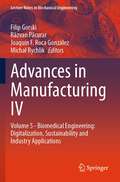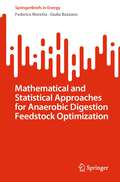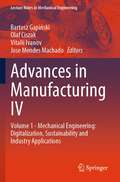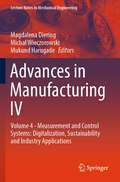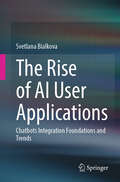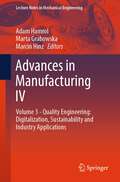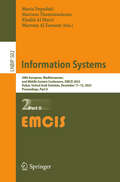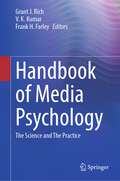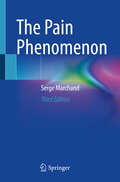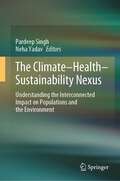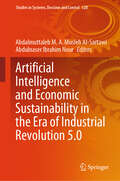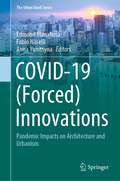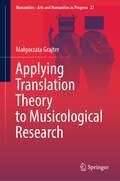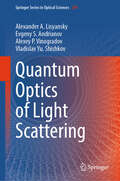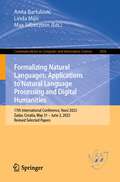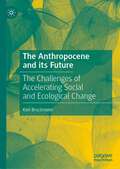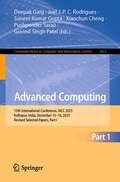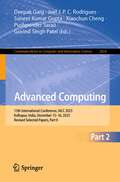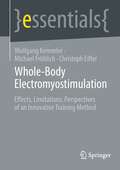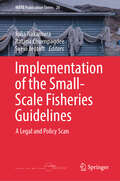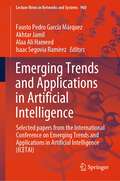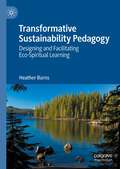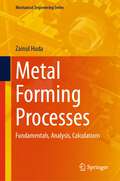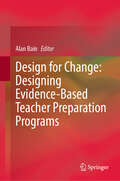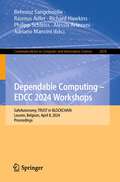- Table View
- List View
Advances in Manufacturing IV: Volume 5 - Biomedical Engineering: Digitalization, Sustainability and Industry Applications (Lecture Notes in Mechanical Engineering)
by Filip Gorski Răzvan Păcurar Joaquín F. Roca González Michał RychlikThe book covers timely topics in digital healthcare and personalized medical products. It delves into the use of digital technologies like image processing, CAD, AI, and 3D printing in healthcare, emphasizing their role in customizing treatment and manufacturing medical products. Based on peer-reviewed contributions to the 8th International International Scientific-Technical Conference (MANUFACTURING 2024) held on May 14-16, 2024, in Poznan, Poland, the chapters reports on achievements from interdisciplinary collaborations between engineers, doctors, and the medical industry. All in all, this book offers a timely guide for researchers and professionals in medical design, manufacturing, and biomedical engineering, and a bridge fostering communication and collaborations between different stakeholders working on enhancing health interventions through technology.
Mathematical and Statistical Approaches for Anaerobic Digestion Feedstock Optimization (SpringerBriefs in Energy)
by Federico Moretta Giulia BozzanoThis book examines biomass mixture modeling and optimization. The book discusses anaerobic digestion and related fermentative processes and explains their compositional dynamics. Early chapter examine macromolecules, elemental fractions, and their direct influence on methane production. Supported by an extensive data bank of substrates obtained from research, the book points out correlations that enable the estimation of global methane production for diverse biomass mixtures. Furthermore, it provides valuable insights into discerning the optimal composition capable of yielding the utmost methane output.The book integrates cutting-edge machine learning techniques and shows how the programming language Python and Julia can be used for analysis and to optimize processes. It has many graphs, figures, and visuals.
Advances in Manufacturing IV: Volume 1 - Mechanical Engineering: Digitalization, Sustainability and Industry Applications (Lecture Notes in Mechanical Engineering)
by Bartosz Gapiński Olaf Ciszak Vitalii Ivanov Jose Mendes MachadoThe book covers timely topics in mechanical engineering, with a special attention to advances in machine design, product assembly, technological aspects of production, mechatronics and production maintenance. Gathering peer-review contributions to the 8th International Scientific-Technical Conference MANUFACTURING 2024, held on May 14-16, 2024, in Poznan, Poland, it reports on cutting-edge research and methods fostering design processes, optimization of industrial processes, such as welding and molding, and machining, with an emphasis on sustainable solutions. All in all, this book offers a timely guide for researchers and professionals in mechanical engineering and manufacturing, yet it is also intended to foster communication and cooperation between universities and industrial partners.
Advances in Manufacturing IV: Volume 4 - Measurement and Control Systems: Digitalization, Sustainability and Industry Applications (Lecture Notes in Mechanical Engineering)
by Magdalena Diering Michał Wieczorowski Mukund HarugadeThis book gathers timely contributions on metrology and measurement and control systems, across different disciplines and fields of applications. The chapters, which were presented at the 8th International Scientific-Technical Conference, MANUFACTURING 2024, held on May 14-16, 2024, in Poznan, Poland, cover cutting-edge research and best-practices concerning the use of AI-based optical, computed tomographic, coordinate metrology and vision inspection systems to assess manufacturing processes and products. They discuss strategies for automating, and for improving the effectiveness of quality control and measuring processes. All in all, this book provides both researchers and practitioners with a timely guide on cutting-edge measuring and control systems supporting the development of modern manufacturing in the context of digitalization, sustainability and industry applications.
The Rise of AI User Applications: Chatbots Integration Foundations and Trends
by Svetlana BialkovaThis monograph introduces readers to core theories and applications in the chatbot AI context. Although AI is attracting significant attention, there is a literature gap and lack of practical guidelines on the key drivers of chatbot efficiency and agency capacity. There is a caveat between algorithmic explanations and actionable understanding, despite the acknowledged importance of inherently human-centric properties. Addressing these gaps, this state-of-the-art book offers a distinctive combination of content, theory, practice evaluation, and a holistic framework encompassing cognitive, emotional and social aspects, focusing on how to enhance AI agency and user experience. The framework aims to drive design, encouraging development of intelligent systems, techniques to evaluate chatbot with purposes, to appropriately meet user needs and market demand for responsible and explainable AI, XAI. Avenues for transforming business and life by implementing new generation AI systems are further discussed, as well as recommendations to overcome consumer resistance and advice for policy measures to reduce risks given the AI boost. While the community is still in an exploratory mode, we hope “The Rise of AI User Applications: Chatbots Integration Foundations and Trends” provides the needed understanding and will inspire researchers across disciplines to combine their efforts and work together on this very intriguing topic.
Advances in Manufacturing IV: Volume 3 - Quality Engineering: Digitalization, Sustainability and Industry Applications (Lecture Notes in Mechanical Engineering)
by Adam Hamrol Marta Grabowska Marcin HinzThis book covers timely topics in quality engineering, with a special focuses on issues relating to Industry 4.0 and 5.0. Based on peer-reviewed contributions to the 8th International Scientific-Technical Conference MANUFACTURING 2024, held on May 14–16, 2024, in Poznan, Poland, the chapters describe advanced engineering methods for managing quality and risk at different stages of the product lifecycle. They discusses the role of the sustainable development aspect in supply chain, in the context of product and business planning, production, and transportation, and the principles and best practices of circular economy. They also highlight the role of the human factor in Industry 5.0, and discuss educational issues. All in all, this book provides both researchers and practitioners with a timely guide on research in the broad area of quality engineering, covering human and environmental aspects of industrial production, and risk-based management methods.
Information Systems: 20th European, Mediterranean, and Middle Eastern Conference, EMCIS 2023, Dubai, United Arab Emirates, December 11-12, 2023, Proceedings, Part II (Lecture Notes in Business Information Processing #502)
by Marinos Themistocleous Khalid Al Marri Maria Papadaki Marwan Al ZarouniThis book constitutes selected papers from the 20th European, Mediterranean, and Middle Eastern Conference, EMCIS 2023, which was held in Dubai, UAE, during December 11-12, 2023. EMCIS covers technical, organizational, business, and social issues in the application of information technology and is dedicated to the definition and establishment of Information Systems (IS) as a discipline of high impact for IS professionals and practitioners. It focuses on approaches that facilitate the identification of innovative research of significant relevance to the IS discipline following sound research methodologies that lead to results of measurable impact. The 43 papers presented in this volume were carefully reviewed and selected from a total of 126 submissions. They were organized in topical sections as follows: Part I: Metaverse; blockchain technology and applications; digital governance; healthcare information systems; artificial intelligence; Part II: Big data and analytics; digital services and social media; innovative research projects; managing information systems; smart cities.
Handbook of Media Psychology: The Science and The Practice
by Grant J. Rich V. K. Kumar Frank H. FarleyThis comprehensive and up-to-date resource presents the state of the science in the expanding and widely influential field of media psychology and technology. Covering theoretical concepts, research, and practice, this handbook explores key areas relevant to developing media psychology and technology in today's world.The impact of media and technology is discussed as are the uses and misuses of various media outlets, including television, film, and social media. How media affects public opinion and attitudes is given special attention, as are psycho-social and neuropsychological factors. The authors are recognized experts in this field, many associated with the American Psychological Association’s Society of Media Psychology and Technology. This relevant and timely handbook provides researchers and academics with rich wide-ranging presentations of an area critical to the dissemination and discussion of results and implications of ongoing scientific investigations for bringingabout social change in democratic societies through the use of media and technology.
The Pain Phenomenon
by Serge MarchandIntroducing the latest edition of The Phenomenon of Pain: A Comprehensive Exploration of Pain Mechanisms and Therapeutic Approaches.In recent decades, pain has emerged as a focal point in both basic and clinical research, reflecting its profound impact on individuals' lives. The rapid advancement of knowledge has deepened our understanding of the complex neurophysiological and psychological mechanisms underlying pain, shedding light on its multifaceted nature. Clinicians grapple daily with the daunting reality of human suffering, navigating its intricate web of causes and manifestations. This continuous engagement with pain presents significant and stressful challenges from the relentless pursuit of understanding and alleviating it. This book transcends mere discourse on the physiological and psychological underpinnings of pain; it delves into the intricate factors contributing to its persistence. Furthermore, it meticulously examines pharmacological and nonpharmacological treatment modalities, forging a crucial link between the mechanisms of pain and therapeutic interventions.By bridging the gap between pain mechanisms and treatment strategies, this edition equips clinicians with invaluable insights to augment their clinical acumen. Armed with this knowledge, clinicians can tailor interventions to effectively address the diverse array of pain presentations encountered in their practice.
The Climate-Health-Sustainability Nexus: Understanding the Interconnected Impact on Populations and the Environment
by Neha Yadav Pardeep SinghIn a compelling scholarly journey, this book unfolds the intricate narratives of human progress and its environmental repercussions catalyzed by the Industrial Revolution. It thoughtfully contrasts the exploitative environmental ideologies stemming from colonization and industrialization against the profound yet often marginalized indigenous ecological philosophies, urging a pivotal shift in environmental stewardship. The narrative meticulously traces the arc of scientific discovery and environmental policy evolution, from Eunice Foote’s groundbreaking hypothesis on the greenhouse effect to the landmark achievements of the Paris Agreement, encapsulating over a century of environmental activism and scholarly debate. The discourse extends beyond traditional environmental concerns, exploring the intersection of climate change with public health, food security, and gender disparities, underscoring the urgency of sustainable agricultural practices and the pivotal role of women in food systems. It introduces the transformative potential of digital health innovations and renewable energy technologies as crucial tools in climate mitigation, highlighting the need for an integrated socio-technical governance model that includes community resilience and biopsychosocial health. The book critically addresses the dynamics of climate finance, advocating for inclusive green growth through strategic renewable energy investments, and revisits the ‘Tragedy of the Commons’ to challenge conventional views on communal resource management. It advocates for a justice-oriented approach to tackling the multifaceted environmental, social, and economic challenges, with a particular lens on the adverse impacts borne by marginalized communities in the Global South. Furthermore, it explores the untapped potential of wild genetic resources in bolstering food security. It aligns with the United Nations’ Sustainable Development Goals, advocating for integrating Indigenous wisdom into urban development strategies. This book is a call to action, serving as a comprehensive scholarly examination that addresses the multifaceted challenges of climate change, health, and sustainability and champions a collective approach towards forging a sustainable and equitable future.
Artificial Intelligence and Economic Sustainability in the Era of Industrial Revolution 5.0 (Studies in Systems, Decision and Control #528)
by Abdalmuttaleb M. A. Musleh Al-Sartawi Abdulnaser Ibrahim NourIndustry 5.0 has been dubbed as the digital revolution with a soul. This book incorporates a wealth of research which integrates artificial intelligence (AI) with economic sustainability and Industry 5.0. It examines the human-centricity of the upcoming digital revolution and the role of sustainable technologies in enhancing the livelihoods of workers, individuals, communities, and eventually societies. It provides insight on important areas related to artificial intelligence, sustainable development, and society 5.0. The chapters present a wide range of topics including block cipher, entrepreneurship and AI, AI and stock trading decisions, digital transformation, knowledge management, chatbot engineering, cybersecurity, and smart metering system. This book is beneficial to scholars and academics who will find in it the knowledge of the support of AI and its contribution to economic sustainability, and solutions to enhance human-centricity and resilience.
COVID-19: Pandemic Impacts on Architecture and Urbanism (The Urban Book Series)
by Anna Yunitsyna Edmond Manahasa Fabio NaselliThis book gives an overview of the shifting paradigm from traditional design techniques and standards to new values and methods that occurred in response to confronting the COVID-19 pandemic. The theoretical studies of the phenomenon of "new normality" in architecture, urbanism and social sciences are a source of knowledge for researchers, professors and students in the fields of architecture, urbanism and interior design. On-site applications of post-COVID-19 structures will be interesting for students, practitioners, developers and city managers. The issue of online design teaching and learning provides a set of practices that can be applied by both educators and trainees. The book also is useful for readers who are interested in recent trends in architecture and interior design: it provides a deep analysis of recent changes in architecture, which aim to make the environment disease-free and the space habitable during the long periods of lockdown.
Applying Translation Theory to Musicological Research (Numanities - Arts and Humanities in Progress #27)
by Małgorzata GrajterThis monograph lays the foundation for new methodologies of research between music and translation. It is the first such holistic attempt—from the perspective of a musicologist—based on the adaptation of translation theories. Until now, these fields have remained underexplored together. Only recently have the tools developed by translation theory permeated into musical scholarship. Such tools should prove as a promising alternative to those offered by classic musicological studies, particularly in reference to musical arrangement, pop music covers and performance. Theoretical discussion on topics are supported by case studies. This text appeals to musicologists and musicians as well as experts in the field of translation theory who are interested in expanding their field of inquiry.
Quantum Optics of Light Scattering (Springer Series in Optical Sciences #249)
by Alexey P. Vinogradov Alexander A. Lisyansky Evgeny S. Andrianov Vladislav Yu. ShishkovThis book presents a quantum framework for understanding inelastic light scattering which is consistent with the classical descriptions of Raman phenomena and Rayleigh scattering, thus creating a unified theoretical picture of light scattering. The Raman effect was discovered in 1928 and has since proved to be one of the most powerful tools to study the molecular structure of gases, liquids, and crystals. The subsequent development of new scientific disciplines such as nonlinear optics, quantum optics, plasmonics, metamaterials, and the theory of open quantum systems has changed our views on the nature of Rayleigh and Raman scattering. Today, there are many excellent books on the theory and applications of light scattering, but a consistent description of light scattering from a unified viewpoint is missing. The authors’ approach has the power to re-derive the results of both classical and quantum approaches while also addressing many questions that are scattered acrossthe research literature: Why is Rayleigh scattering coherent while Raman scattering is not, although both phenomena are caused by the incidence of a coherent wave? Why are coherent Stokes and coherent anti-Stokes Raman scattering caused by two coherent incident waves both always coherent? This book answers these questions and more, and explains state-of-the-art experimental results with a first-principles approach that avoids phenomenological arguments. Many of the results presented are appearing in book form for the first time, making this book especially useful for young researchers entering the field. The book reviews basic concepts of quantum mechanics and quantum optics and comes equipped with problems and solutions to develop understanding of the key mathematical techniques. The rigorous approach presented in the book is elegant and readily grasped, and will therefore prove useful to both theorists and experimentalists at the graduate level and above, as well as engineers who useRaman scattering methods in their work.
Formalizing Natural Languages: 17th International Conference, NooJ 2023, Zadar, Croatia, May 31–June 2, 2023, Revised Selected Papers (Communications in Computer and Information Science #1816)
by Anita Bartulović Linda Mijić Max SilberzteinThis book constitutes the refereed proceedings of the 17th International Conference on Formalizing Natural Languages with NooJ 2023 and Its Natural Language Processing Applications, NooJ 2023, held in Zadar, Croatia, during May 31–June 2, 2023. The 19 full papers included in this book were carefully reviewed and selected from 64 submissions. They were organized in topical sections as follows: morphological and lexical resources; syntactic and semantic resources; corpus linguistics and discourse analysis; and natural language processing applications.
The Anthropocene and its Future: The Challenges of Accelerating Social and Ecological Change
by Karl BruckmeierThis book analyses the complex social and ecological processes of the Great Acceleration, the Great Transformation, and sustainable development that shape the future of the global society in the twenty-first century. The first process takes place for a longer time, the second over the past thirty years, with attempts to build a sustainable economy and society in the global policy of sustainable development. The processes and their interaction will be discussed with knowledge from inter- and transdisciplinary transformation research, social and political ecology, and theories of modern society. The guiding theoretical concepts for the social-ecological transformation will be clarified: the concepts of acceleration, transformation, and sustainable development, and the societal and ecological processes they include. To obtain a more detailed picture of the changes in the global social-ecological system, different parts of the global transformation, the digital transformation, the transformation of food systems, and the transformation of modes of living in the social lifeworld are described to show the complex changes in the epoch of the Anthropocene more concretely. The global change processes in society and nature are caused by human forces but are difficult to control through policy and governance. With the interdisciplinary integration of concepts and knowledge, it becomes possible to provide a more detailed picture, of the difficulties to achieve a sustainable future society.
Advanced Computing: 13th International Conference, IACC 2023, Kolhapur, India, December 15–16, 2023, Revised Selected Papers, Part I (Communications in Computer and Information Science #2053)
by Deepak Garg Joel J. P. C. Rodrigues Suneet Kumar Gupta Xiaochun Cheng Pushpender Sarao Govind Singh PatelThe two-volume set CCIS 2053 and 2054 constitutes the refereed post-conference proceedings of the 13th International Advanced Computing Conference, IACC 2023, held in Kolhapur, India, during December 15–16, 2023.The 66 full papers and 6 short papers presented in these proceedings were carefully reviewed and selected from 425 submissions. The papers are organized in the following topical sections:Volume I:The AI renaissance: a new era of human-machine collaboration; application of recurrent neural network in natural language processing, AI content detection and time series data analysis; unveiling the next frontier of AI advancement.Volume II:Agricultural resilience and disaster management for sustainable harvest; disease and abnormalities detection using ML and IOT; application of deep learning in healthcare; cancer detection using AI.
Advanced Computing: 13th International Conference, IACC 2023, Kolhapur, India, December 15–16, 2023, Revised Selected Papers, Part II (Communications in Computer and Information Science #2054)
by Deepak Garg Joel J. P. C. Rodrigues Suneet Kumar Gupta Xiaochun Cheng Pushpender Sarao Govind Singh PatelThe two-volume set CCIS 2053 and 2054 constitutes the refereed post-conference proceedings of the 13th International Advanced Computing Conference, IACC 2023, held in Kolhapur, India, during December 15–16, 2023.The 66 full papers and 6 short papers presented in these proceedings were carefully reviewed and selected from 425 submissions. The papers are organized in the following topical sections:Volume I:The AI renaissance: a new era of human-machine collaboration; application of recurrent neural network in natural language processing, AI content detection and time series data analysis; unveiling the next frontier of AI advancement.Volume II:Agricultural resilience and disaster management for sustainable harvest; disease and abnormalities detection using ML and IOT; application of deep learning in healthcare; cancer detection using AI.
Whole-Body Electromyostimulation: Effects, Limitations, Perspectives of an Innovative Training Method (essentials)
by Wolfgang Kemmler Michael Fröhlich Christoph EiflerThis essential is intended as a compact reference for issues and aspects related to the innovative training technology of whole-body electromyostimulation (WB-EMS). In addition to background and information on WB-EMS application, in which the authors pay particular attention to safe and effective use, there is a current overview of research results summarizing the effects of WB-EMS on various target outcomes. Finally, a characterization of the market situation, current trends and a forecast of developments in the field of WB-EMS is presented.
Implementation of the Small-Scale Fisheries Guidelines: A Legal and Policy Scan (MARE Publication Series #28)
by Julia Nakamura Ratana Chuenpagdee Svein JentoftThis book provides a transdisciplinary assessment of multiple countries’ legal and policy frameworks vis-à-vis the Voluntary Guidelines for Securing Sustainable Small-Scale Fisheries in the Context of Food Security and Poverty Eradication, adopted in 2014 by the Committee on Fisheries of the Food and Agriculture Organization of the United Nations. Based on an appraisal framework used to facilitate the unpacking of those frameworks, this book collects country experiences and regional perspectives on a range of cross-cutting issues underpinning the protection of the rights and the promotion of justice for small-scale fishers and their communities.This book aims to be the first collection to present a systematic and in-depth assessment of existing national legal and policy frameworks vis-à-vis the SSF Guidelines. This assessment is done through the transdisciplinary and collaborative work of researchers, governments, and civil society organizations for the analysis of the cross-thematic questions, which the contributors of this book aim to address. Firstly, what are the relevant laws and policies that matter for securing rights of small-scale fishers and their communities? How are small-scale fisheries defined by national laws and policies? How are small-scale fisheries treated (i.e., specifically or generally) in these instruments? Are there specific provisions and references to small-scale fisheries or any of its associated terminologies (e.g., artisanal, subsistence, traditional, indigenous)? Secondly, how the relevant instruments address the 8 small-scale fisheries key issues outlined in that rapid appraisal study? What are the strengths and gaps in these instruments? Do they address issues that are not covered by the SSF Guidelines? Do they contribute to clarifying other legal issues that are relevant for sustainable small-scale fisheries? Finally, since the book also aims to explore the accessibility of these legal and policy instruments for those to which they matter the most (the small-scale fishers), the following questions were also considered: What challenges do they face in knowing and understanding the relevant laws and policies in place? Which tools, measures and processes are available in the countries to ensure small-scale fishers can claim for their rights? To what extent judicial courts have recognized and/or granted rights to small-scale fishers?Chapters 11 and 20 are available open access under a Creative Commons Attribution 4.0 International License via link.springer.com.
Emerging Trends and Applications in Artificial Intelligence: Selected papers from the International Conference on Emerging Trends and Applications in Artificial Intelligence (ICETAI) (Lecture Notes in Networks and Systems #960)
by Fausto Pedro García Márquez Akhtar Jamil Alaa Ali Hameed Isaac Segovia RamírezThe book covers the proceedings of the International Conference on Emerging Trends and Applications in Artificial Intelligence (ICETAI) held at Istanbul Medipol University, Turkey, on 24 – 25 August 2023. It presents a comprehensive compilation of papers covering the forefront of artificial intelligence, encapsulating state-of-the-art models, innovative methodologies applied to benchmark datasets, and incisive analyses addressing contemporary challenges. Encompassing four pivotal tracks—Artificial Intelligence and Machine Learning, Big Data and Cloud Computing, Internet of Things and Sensor Technology, and Applications of Artificial Intelligence—this volume serves as a vital resource for researchers, scholars, and professionals navigating the multifaceted landscape of AI advancements and their real-world applications across diverse domains.
Transformative Sustainability Pedagogy: Designing and Facilitating Eco-Spiritual Learning
by Heather BurnsThis book offers stories and tools for designing and facilitating transformative sustainability pedagogy and explores how educators can intentionally design and facilitate eco-spiritual learning that promotes healing and wholeness. In these times of accelerating climate change and systemic injustice, we need learning spaces that both challenge our unsustainable dominant paradigms and support us in re-learning how to live in relational and regenerative ways. Rooted in the paradigm of interconnection and relationality, this book offers practical ways to design and facilitate learning toward more just, ecological, and spiritual ways of being. The author weaves together a variety of personal stories of teaching and learning, an exploration of how new science can be applied to transformative sustainability pedagogy, and eco-spiritual practices to help educators nurture wholeness and connection in themselves and in learning spaces.
Metal Forming Processes: Fundamentals, Analysis, Calculations (Mechanical Engineering Series)
by Zainul HudaThis unique textbook features fundamentals and analyses of metal forming processes supported by 200 worked numerical examples. It provides rigorous detail on the three all-important groups of metal-forming processes: bulk-metal forming, sheet-metal forming, and sheet-bulk-metal forming. Theory of metal forming is presented by discussing deformation behavior, plasticity, and formability with a thorough mathematical analyses and calculations. The mechanics of sheet metal forming is also covered by including principal strain increments in uniaxial loading as well as plane stress deformation. There are 125 diagrammatic illustrations/real-life photographs that have been labelled properly to enhance the understanding of readers. Among the salient features of the book is the inclusion of industrially-oriented projects, covering both technological and business considerations. The key solutions connected to these projects are presented with the aid of mathematical analysis and process flow diagrams. The book includes 100 multiple-choice questions (MCQs) with their answers and those for selected problems facilitating self-directed learning.
Design for Change: Designing Evidence-Based Teacher Preparation Programs
by Alan BainThis book focuses on enhancing teacher education quality by making evidence- informed decisions about policy, assessing quality, establishing effective strategies, and innovating teacher preparation programs. It advocates for the importance of rigorous program design and evaluation as the basis for shaping policy directions and claiming program effectiveness. The book introduces "Design for Change" (DfC), a 20-year-long collaborative effort by a group of teacher educators dedicated to improving their practices. DfC is divided into two parts: Design for Change-Teams and Process (DfC-TaP) and Design for Change-Programs and Courses (DfC-PaC). DfC-TaP explores how to form and sustain a design team of academics, emphasizing the collaborative process's value in program development. DfC-PaC delves into applying practical theory to curriculum design, mapping programs to standards, creating meaningful learning and assessment tasks, and leveraging technology. The latterincludes a chapter on software for teacher preparation program design. The book's ultimate goal is to offer a versatile framework for designing teacher education programs. The book employs evidence from longitudinal research to present generalizable concepts and structures for program developers and designers. By doing so, the book aims to contribute to the field by providing a research-based guide for building teacher education programs that enhance the overall educational experience for both faculty and students.
Dependable Computing – EDCC 2024 Workshops: SafeAutonomy, TRUST in BLOCKCHAIN, Leuven, Belgium, April 8, 2024, Proceedings (Communications in Computer and Information Science #2078)
by Behrooz Sangchoolie Rasmus Adler Richard Hawkins Philipp Schleiss Alessia Arteconi Adriano ManciniThis book constitutes the refereed proceedings of Workshops held at the 19th European Dependable Computing Conference, EDCC 2024: First Workshop on Safe Autonomous Systems, SafeAutonomy 2024, and the First Workshop on the Role of TRUST in the implementation of Digital Technologies: Blockchain Technology and Artificial Intelligence in Smart Cities, TRUST IN BLOCKCHAIN 2024. The 13 workshop papers presented in this book were thoroughly reviewed and selected from 14 submissions. The TRUST IN BLOCKCHAIN workshop accepted extended abstract submissions, whereas the SafeAutonomy workshop accepted regular technical papers, case studies, PhD forum papers, as well as position papers. They deal with latest research results on theory, techniques, systems, and tools for the design, validation, operationand evaluation of dependable and secure computing systems.
